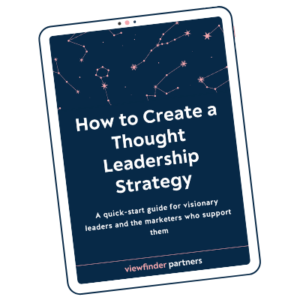Does this script ever play in your head?
Don’t get political. Don’t say anything you’ll regret. The internet lives forever.
These are the old rules of the “professional workplace.” I talk to a lot of people who worry about what they’re allowed to say, what feathers they’ll ruffle, and the people who won’t agree with them.
But after last week’s Roe v. Wade decision — after I have laid awake at night, worried about my friends who are newly pregnant or trying to get pregnant or very much don’t want to be pregnant, whose physical health is now at risk — I say forget the old rules.
Everything has changed now.

For a few years now, I’ve been mulling over questions like: Who gets to be a thought leader? Who gets to air their ideas publicly? Who gets to be the voice of a brand? Whose voice matters?
I was working through these questions earlier in June when I led a workshop of women who work in social impact. I was surprised at how much they bristled at the idea of being a thought leader. They told me they shy away from speaking up, especially in public spaces. “We focus more on doing the work, not talking about it,” they told me. I pushed them to shed their hesitation and step into a position of authority. To own their experience and claim their power.
I found myself prompting a group of smart, experienced women to start speaking up. To claim “thought leadership” as an act of generosity, not an expression of ego. We made some progress, and I left the workshop feeling encouraged. I had seen some lightbulbs go off.
And then the Roe v. Wade decision happened. And that push to stand up and start talking suddenly seemed much, much, much more urgent.
My feelings felt familiar. We’ve been here before. I thought about the summer of 2020, when we all faced what it means to be anti-racist. Being anti-racist means taking risks and using your voice. And advocating for abortion rights means taking risks, too.
After a few dark days sitting inside my own rage, fear, and disbelief, I realized…this is why each of our voices matter so much. The people who are making important decisions aren’t hearing our voices.
In my own circles, women talk to each other about everything. Nothing is off-limits. It’s a big part of what I cherish about my female friendships. I have long conversations with work friends about relationships, finances, ambition, parenting … and bodies.
Our own bodies are urgent and relevant and important to us. Of course they are. People who are in the thick of having babies or surrounded by peers who are having babies know a lot about the intricacies of fertility, conception, pregnancy, and birth. We share intimate details with each other. We read the latest research. Find me a person who has been pregnant in the last five years and doesn’t know who Emily Oster is. WE KNOW THIS STUFF. We know what an ectopic pregnancy is and what a missed miscarriage is because chances are, our friend or neighbor has experienced one, or we’ve experienced one ourselves. We read birth stories on the internet. We grieve with each other over miscarriages and know exactly how D&Cs happen. We drive our friends to get abortions and sit with them in their pain. We send each other cookies and soup when we’re celebrating and when we’re grieving. These aren’t “political” conversations. They’re as personal as our own bodies. They’re as important as our friendships.
But once we get into more “professional” or public spaces, the conversation stops flowing as freely. That’s not surprising. We’re all taught that we should be more formal, careful, and neutral in work contexts. Don’t get political. Don’t say anything you’ll regret. The internet lives forever.
It’s time to forget those old rules. Where have they gotten us?
It’s time for our voices to be heard. About whatever topic you’re passionate about, whether it’s conscious capitalism or the human right to make decisions about your body or the circular economy or equity at work. Actually, this applies to topics you’re not even “passionate” about, but that you know something about. Your basic knowledge isn’t making it into the mainstream.
So it’s time to start talking.
Not because we want to make the ego play of being known as a “thought leader” or an “influencer.” Not because we want to be the loudest voice in the room. But because it’s abundantly clear that as a country and a culture, there aren’t enough voices being heard. We’re not talking about what we know to be true.
If you have something to say (and you do!), especially if you have new ideas or an unexpected way of looking at the world or your work, it’s time to stand up and speak up. No one is going to invite you or give you permission. In fact, conventional wisdom will tell you to sit down and wait your turn.
Nope. Forget the old rules. It’s your turn now. I give you permission.
Who gets to be a thought leader?
What about you? What about now? Why not?
This is an abridged version of my email newsletter, which I send every other Friday. Sign up (look for the form in the sidebar, over there –>) to get ideas about modern thought leadership, plus what I’m reading and what made me laugh this week.






